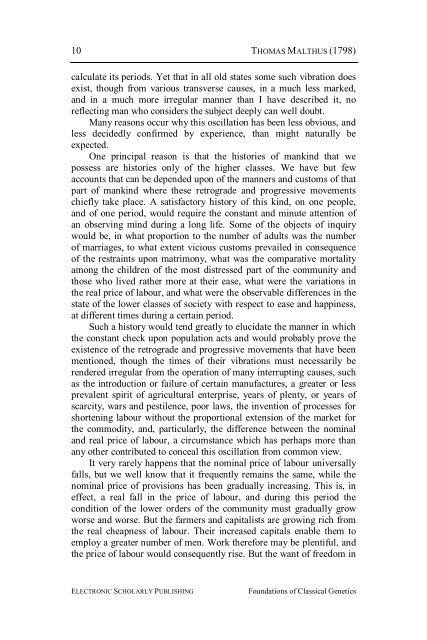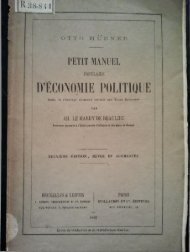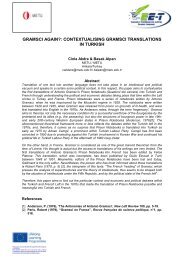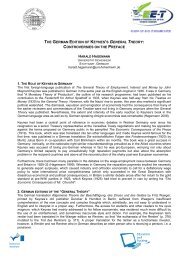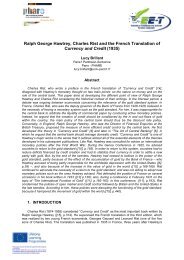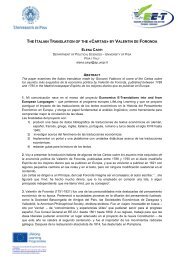Malthus, Thomas, Robert, An Essay on the Principle of Population ...
Malthus, Thomas, Robert, An Essay on the Principle of Population ...
Malthus, Thomas, Robert, An Essay on the Principle of Population ...
You also want an ePaper? Increase the reach of your titles
YUMPU automatically turns print PDFs into web optimized ePapers that Google loves.
10 THOMAS MALTHUS (1798)<br />
calculate its periods. Yet that in all old states some such vibrati<strong>on</strong> does<br />
exist, though from various transverse causes, in a much less marked,<br />
and in a much more irregular manner than I have described it, no<br />
reflecting man who c<strong>on</strong>siders <strong>the</strong> subject deeply can well doubt.<br />
Many reas<strong>on</strong>s occur why this oscillati<strong>on</strong> has been less obvious, and<br />
less decidedly c<strong>on</strong>firmed by experience, than might naturally be<br />
expected.<br />
One principal reas<strong>on</strong> is that <strong>the</strong> histories <strong>of</strong> mankind that we<br />
possess are histories <strong>on</strong>ly <strong>of</strong> <strong>the</strong> higher classes. We have but few<br />
accounts that can be depended up<strong>on</strong> <strong>of</strong> <strong>the</strong> manners and customs <strong>of</strong> that<br />
part <strong>of</strong> mankind where <strong>the</strong>se retrograde and progressive movements<br />
chiefly take place. A satisfactory history <strong>of</strong> this kind, <strong>on</strong> <strong>on</strong>e people,<br />
and <strong>of</strong> <strong>on</strong>e period, would require <strong>the</strong> c<strong>on</strong>stant and minute attenti<strong>on</strong> <strong>of</strong><br />
an observing mind during a l<strong>on</strong>g life. Some <strong>of</strong> <strong>the</strong> objects <strong>of</strong> inquiry<br />
would be, in what proporti<strong>on</strong> to <strong>the</strong> number <strong>of</strong> adults was <strong>the</strong> number<br />
<strong>of</strong> marriages, to what extent vicious customs prevailed in c<strong>on</strong>sequence<br />
<strong>of</strong> <strong>the</strong> restraints up<strong>on</strong> matrim<strong>on</strong>y, what was <strong>the</strong> comparative mortality<br />
am<strong>on</strong>g <strong>the</strong> children <strong>of</strong> <strong>the</strong> most distressed part <strong>of</strong> <strong>the</strong> community and<br />
those who lived ra<strong>the</strong>r more at <strong>the</strong>ir ease, what were <strong>the</strong> variati<strong>on</strong>s in<br />
<strong>the</strong> real price <strong>of</strong> labour, and what were <strong>the</strong> observable differences in <strong>the</strong><br />
state <strong>of</strong> <strong>the</strong> lower classes <strong>of</strong> society with respect to ease and happiness,<br />
at different times during a certain period.<br />
Such a history would tend greatly to elucidate <strong>the</strong> manner in which<br />
<strong>the</strong> c<strong>on</strong>stant check up<strong>on</strong> populati<strong>on</strong> acts and would probably prove <strong>the</strong><br />
existence <strong>of</strong> <strong>the</strong> retrograde and progressive movements that have been<br />
menti<strong>on</strong>ed, though <strong>the</strong> times <strong>of</strong> <strong>the</strong>ir vibrati<strong>on</strong>s must necessarily be<br />
rendered irregular from <strong>the</strong> operati<strong>on</strong> <strong>of</strong> many interrupting causes, such<br />
as <strong>the</strong> introducti<strong>on</strong> or failure <strong>of</strong> certain manufactures, a greater or less<br />
prevalent spirit <strong>of</strong> agricultural enterprise, years <strong>of</strong> plenty, or years <strong>of</strong><br />
scarcity, wars and pestilence, poor laws, <strong>the</strong> inventi<strong>on</strong> <strong>of</strong> processes for<br />
shortening labour without <strong>the</strong> proporti<strong>on</strong>al extensi<strong>on</strong> <strong>of</strong> <strong>the</strong> market for<br />
<strong>the</strong> commodity, and, particularly, <strong>the</strong> difference between <strong>the</strong> nominal<br />
and real price <strong>of</strong> labour, a circumstance which has perhaps more than<br />
any o<strong>the</strong>r c<strong>on</strong>tributed to c<strong>on</strong>ceal this oscillati<strong>on</strong> from comm<strong>on</strong> view.<br />
It very rarely happens that <strong>the</strong> nominal price <strong>of</strong> labour universally<br />
falls, but we well know that it frequently remains <strong>the</strong> same, while <strong>the</strong><br />
nominal price <strong>of</strong> provisi<strong>on</strong>s has been gradually increasing. This is, in<br />
effect, a real fall in <strong>the</strong> price <strong>of</strong> labour, and during this period <strong>the</strong><br />
c<strong>on</strong>diti<strong>on</strong> <strong>of</strong> <strong>the</strong> lower orders <strong>of</strong> <strong>the</strong> community must gradually grow<br />
worse and worse. But <strong>the</strong> farmers and capitalists are growing rich from<br />
<strong>the</strong> real cheapness <strong>of</strong> labour. Their increased capitals enable <strong>the</strong>m to<br />
employ a greater number <strong>of</strong> men. Work <strong>the</strong>refore may be plentiful, and<br />
<strong>the</strong> price <strong>of</strong> labour would c<strong>on</strong>sequently rise. But <strong>the</strong> want <strong>of</strong> freedom in<br />
ELECTRONIC SCHOLARLY PUBLISHING<br />
Foundati<strong>on</strong>s <strong>of</strong> Classical Genetics


